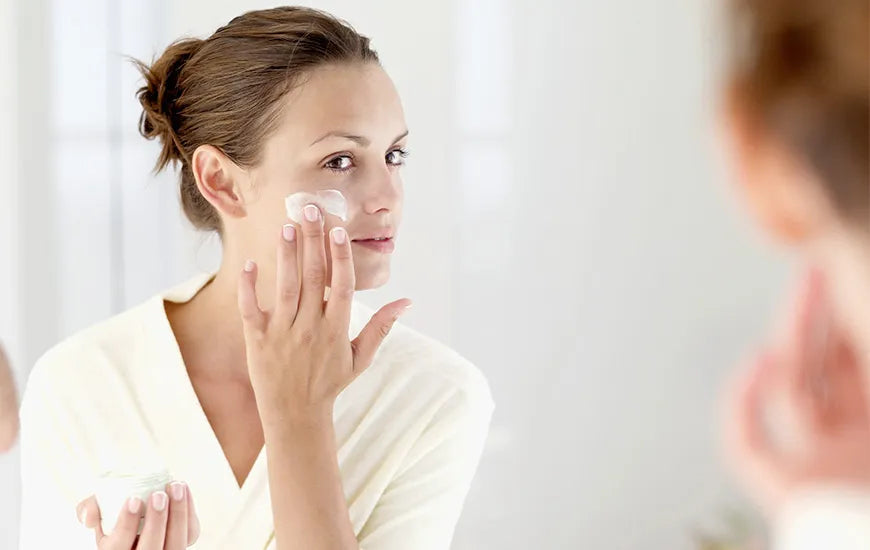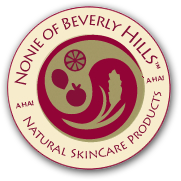
Chemical vs. Physical Exfoliants: What They Are and How They Can Elevate Your Skincare Regimen
Share
Summer is swiftly approaching, and with warmer weather comes bare-skin beach days and a co-dependent relationship with your trusty bottle of SPF.
In order to showcase your best face yet, it is important to stay true to your skincare routine and make sure you are properly removing every trace of makeup, sunscreen, dirt and debris from your skin at the end of the day. To neglect this essential part of your regimen is to invite pesky blemishes to the surface of your face by leaving your pores clogged and unattended to.
The best way to get clean, glowing, summer-ready skin is to find an exfoliation technique and routine that works well for you and your lifestyle. The most common at home exfoliation products are either a physical or chemical exfoliant. Believe it or not, these two types of exfoliants are not interchangeable, and though both can be utilized throughout your routine, they have various purposes and requirements when it comes to bestowing their clear skin graces upon you.
What Exactly is Exfoliation?
Exfoliating is the process of removing dead skin cells and debris from the surface of your skin. Exfoliation improves your complexion, reduces the appearance and frequency of acne scarring and blemishes, and even helps with hyperpigmentation concerns.
This process does not have to be abrasive to work properly, and in fact, the more gentle your exfoliator, the more in tact your skin barrier will remain. A good exfoliator will leave your skin appearing soft and clean while imbibing it with a good amount of moisture at the same time.
Types of Exfoliation
Physical (Mechanical) Exfoliation
Physical exfoliation entails using minuscule granules to gently buff away dead skin cells and other impurities from your skin’s surface. We typically refer to these products as “face scrubs”, but using a facial brush for lymphatic drainage or any type of textured cloth would also qualify as a physical exfoliation treatment. Microdermabrasion or dermaplaning are forms of physical exfoliation as well.
This is the most common form of exfoliation, and in recent years there has been a ton of misinformation spread about the process. There was a short period in time when plenty of people claimed that physical exfoliants were too abrasive on the skin, which is not true for the most part. As long as you pay attention to what your skin likes, physical exfoliation is a totally safe and valid option for ridding your face of unwanted impurities.
Chemical Exfoliation
The term “acid” in skincare probably sounds a little scary, but chemical exfoliants are some of the most important active ingredients in your beauty products. Chemical exfoliants are Alpha Hydroxy Acids (AHAs) or Beta Hydroxy Acids (BHAs) that work to improve skin cell turnover, aid in anti-aging efforts, refine your complexion, and remove traces of impurities from the surface of your skin. AHAs are natural acids derived from foods, such as lemon, grapefruit, and apples. Some of the most common AHAs are glycolic acid, citric acid, and malic acid.
In all of our AHA! products, we use an array of all-natural fruit enzymes to help slough away dead skin cells, revealing the gorgeous skin you’ve been striving to unveil for so long. BHAs are oil-soluble compounds that work to decongest the skin, treating and reducing acne while being packed with anti-inflammatory properties. One common BHA that is widely used is salicylic acid, a great active ingredient used to shun unwanted blemishes.
Chemical Exfoliation vs. Physical Exfoliation
Though these two types of exfoliation tend to go hand in hand, they do have some firm differences. The main difference between these two processes is how they remove dead skin cells from your face and body. Chemical exfoliation requires the use of enzymes to dissolve these dead skin cells, excess makeup, and other debris. Some chemical exfoliants may not even require you to wash them off after, and are safe enough to use up to two times a day for those with skin that can handle it.
Physical exfoliation needs a bit more elbow grease to get the job done – textured material or tiny particles lift and remove these dead skin cells from your face as you buff and scrub your skin. This process may also be harsher on your skin, and should not be used as frequently as chemical exfoliation. Rubbing and scrubbing your skin too much is an easy way to damage your skin’s moisture barrier, which is an important aspect of your bodily maintenance to attend to.
Top 5 Exfoliation Products of 2022
Nonie of Beverly Hills AHA! Skin Cleanser
This skin cleanser is an amazing option for those who tend to wear makeup or for more mature skin that needs a little extra push to achieve a bright, youthful glow. Formulated as a cleansing lotion, this product leaves your skin feeling soft, moisturized and refreshed, free of makeup residue and grime. An alcohol-free formula packed with natural fruit enzymes such as lemon, grapefruit, and orange, this cleanser will provide your face with a gentle, yet thorough wash, allowing your skin to be free from irritation and pore-clogging impurities.
Paula’s Choice Skin Perfecting 2% BHA Liquid Exfoliant
Paula Choice is a revered brand by many estheticians, and its liquid exfoliant is definitely one of their holy grail products. This chemical exfoliant can be used daily, as it has a pH level of 3.2-3.8. The formula sinks quickly into the skin for easy application, allowing the power of salicylic acid to tackle your blemish concerns and keep your complexion smooth and clear.
Typology Regenerating Facial Scrub
While many face scrubs tend to leave your face feeling dry and thirsty for moisture, this Typology facial scrub leaves you dewy and glowing well before you apply any moisturizer. Crafted with olive-derived squalane, geranium rosat essential oil, and apricot kernel powder, this scrub is a great weekly anti-aging treatment for dry and sensitive skin.
Kate Somerville ExfoliKate Intensive Exfoliating Treatment
A two-minute miracle, this Kate Somerville exfoliating treatment uses lactid acid and salicylic acid to reach deep into your pores to slough away impacted dead skin with the help of fruit enzymes such as papaya, pumpkin and pineapple. Aloe Vera and Vitamin E replenish and protect your moisture barrier so you can achieve clear skin and the reduced appearance of wrinkles, and keep it that way.
Tatcha The Rice Polish Powder Exfoliator
A luxury buy for sure, this Tatcha Rice Polish powder, when combined with water, uses microscopic rice bran and skin-softening silk protein to bless you with the glow of a lifetime. This powder turns into a lush foam, allowing you to dabble in a spa-like experience in the comfort of your own home.
How Often Should I Exfoliate?
It is absolutely possible to overdo it on the exfoliating front, and if you’re new to the process, stick to one session a week just to be safe. Once you’ve got a good grip on how your skin will react, feel free to combine both physical and chemical exfoliants in your weekly routine. Physical exfoliants should be used no more than 3 times a week, and if your skin is sensitive, stick to once a week when coupled with chemical exfoliation treatments. Chemical exfoliants can be used multiple times a week, and even daily depending on the chemical concentration. If you have any questions, always consult your dermatologist or esthetician, and never continue using a product if you find your skin is irritated by it.
Exfoliation will also make you extra photosensitive, so be sure to wear sunscreen every morning before going out. In fact, even if you don’t leave the house, sunscreen can be a beneficial option to further protect your skin and clear up many of the complexion issues you may be experiencing.
Wrap Up
At Nonie of Beverly Hills, we have an assortment of anti-aging and complexion-rescuing products that will have you gleaming from head to toe. Exfoliation is truly the skin to Hollywood-esque silky skin, and if you haven’t started yet, we have the perfect cleansing starter kit of AHA! products for you to take your skincare journey to the next level.





